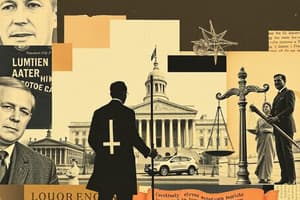Podcast
Questions and Answers
What does the word democracy mean?
What does the word democracy mean?
- Government by representatives
- Government by monarchs
- Government by the elite
- Government by the people (correct)
In a direct democracy, citizens vote directly on issues rather than electing representatives.
In a direct democracy, citizens vote directly on issues rather than electing representatives.
True (A)
Name one key feature of a democratic society.
Name one key feature of a democratic society.
freedom of expression
A representative democracy involves citizens voting for _____ to make laws on their behalf.
A representative democracy involves citizens voting for _____ to make laws on their behalf.
Which group was excluded from voting in classical democracy in Athens?
Which group was excluded from voting in classical democracy in Athens?
Most representative democracies do not have a constitution.
Most representative democracies do not have a constitution.
What system is the opposite of a representative democracy?
What system is the opposite of a representative democracy?
The ideals of classical democracy included _____ between all citizens.
The ideals of classical democracy included _____ between all citizens.
Match the following terms with their definitions:
Match the following terms with their definitions:
Which of the following is a characteristic of a democratic society?
Which of the following is a characteristic of a democratic society?
What is the main characteristic of representative democracy?
What is the main characteristic of representative democracy?
In classical democracy, all citizens were allowed to vote regardless of gender or status.
In classical democracy, all citizens were allowed to vote regardless of gender or status.
Name one additional feature that is generally associated with democratic societies besides freedom of expression.
Name one additional feature that is generally associated with democratic societies besides freedom of expression.
The opposite of direct democracy is _____ democracy.
The opposite of direct democracy is _____ democracy.
Match the following characteristics with their descriptions:
Match the following characteristics with their descriptions:
Which of the following best describes a key feature of classical democracy?
Which of the following best describes a key feature of classical democracy?
Representative democracies typically have a constitution to limit the power of elected representatives.
Representative democracies typically have a constitution to limit the power of elected representatives.
How does democracy evolve, according to the given information?
How does democracy evolve, according to the given information?
In representative democracies, citizens elect _______ to run the country.
In representative democracies, citizens elect _______ to run the country.
What is a defining feature of Athenian democracy?
What is a defining feature of Athenian democracy?
Which of the following best describes representative democracy?
Which of the following best describes representative democracy?
In classical democracy, all adult male citizens were permitted to vote.
In classical democracy, all adult male citizens were permitted to vote.
Name one characteristic that is generally associated with democratic societies.
Name one characteristic that is generally associated with democratic societies.
A system where power is divided and questioned is known as _____ and balances.
A system where power is divided and questioned is known as _____ and balances.
What limitation is commonly placed on representatives in a democracy?
What limitation is commonly placed on representatives in a democracy?
Match the type of democracy with its description:
Match the type of democracy with its description:
Most democratic societies lack provisions for freedom of the press.
Most democratic societies lack provisions for freedom of the press.
What is the main difference between representative and direct democracy?
What is the main difference between representative and direct democracy?
In ancient Athens, only adult male citizens who owned _____ were allowed to vote.
In ancient Athens, only adult male citizens who owned _____ were allowed to vote.
Flashcards are hidden until you start studying
Study Notes
Definition and Interpretation of Democracy
- Originates from Greek, meaning "government by the people."
- Evolving concept with various interpretations throughout history.
- Key features of democratic societies include:
- Freedom of expression and opinion.
- Freedom of the press.
- Rule of law and equal opportunities.
- Tolerance and respect for human rights.
Representative Democracy
- Citizens elect representatives to create laws and govern on their behalf.
- Common in the UK with elections for councils and Members of Parliament (MPs).
- Distinct from direct democracy; allows broader political representation.
- Typically involves multiple political parties and candidates.
- Constitutions often establish limits on representatives' powers.
- Independent judiciary to enforce constitutional checks and balances.
Classical Democracy (Direct Democracy)
- Began in Athens over 2,500 years ago, emphasizing direct citizen participation.
- Only adult male landowners could vote; excluded peasants, women, slaves, and foreigners.
- Citizens gathered in assemblies to vote on decisions directly.
- Central ideals included equality among citizens, liberty, and the rule of law.
Drawbacks of Direct Democracy
- Limited voter eligibility, excluding significant portions of the population.
- Inconvenience of requiring attendance at frequent large assemblies.
- Necessitated the use of representatives for quicker decision-making on less significant issues.
Referendums in the UK Timeline
- 1997: Devolution referendums in Scotland and Wales, leading to the establishment of respective parliaments and assemblies.
- 1998: Referendum for a directly elected Mayor for London and devolution of powers.
- 1998: Power-sharing agreement referendum in Northern Ireland.
- 2011: Alternative vote referendum aimed at changing the voting system in the UK.
- 2014: Independence referendum held in Scotland.
- 2016: Referendum on Britain's membership in the European Union.
Definition and Interpretation of Democracy
- Originates from Greek, meaning "government by the people."
- Evolving concept with various interpretations throughout history.
- Key features of democratic societies include:
- Freedom of expression and opinion.
- Freedom of the press.
- Rule of law and equal opportunities.
- Tolerance and respect for human rights.
Representative Democracy
- Citizens elect representatives to create laws and govern on their behalf.
- Common in the UK with elections for councils and Members of Parliament (MPs).
- Distinct from direct democracy; allows broader political representation.
- Typically involves multiple political parties and candidates.
- Constitutions often establish limits on representatives' powers.
- Independent judiciary to enforce constitutional checks and balances.
Classical Democracy (Direct Democracy)
- Began in Athens over 2,500 years ago, emphasizing direct citizen participation.
- Only adult male landowners could vote; excluded peasants, women, slaves, and foreigners.
- Citizens gathered in assemblies to vote on decisions directly.
- Central ideals included equality among citizens, liberty, and the rule of law.
Drawbacks of Direct Democracy
- Limited voter eligibility, excluding significant portions of the population.
- Inconvenience of requiring attendance at frequent large assemblies.
- Necessitated the use of representatives for quicker decision-making on less significant issues.
Referendums in the UK Timeline
- 1997: Devolution referendums in Scotland and Wales, leading to the establishment of respective parliaments and assemblies.
- 1998: Referendum for a directly elected Mayor for London and devolution of powers.
- 1998: Power-sharing agreement referendum in Northern Ireland.
- 2011: Alternative vote referendum aimed at changing the voting system in the UK.
- 2014: Independence referendum held in Scotland.
- 2016: Referendum on Britain's membership in the European Union.
Overview of Democracy
- Originates from the Greek word meaning "government by the people."
- Definition and implementation of democracy evolve over time.
- Common elements include freedom of expression, opinion, and the press, rule of law, equal opportunities, tolerance, and respect for human rights.
Representative Democracy
- Citizens elect representatives to create laws and govern.
- Example: Election of councillors and MPs in the UK.
- Features multiple political parties and candidates.
- Typically includes a constitution to define representatives' power limits.
- Independent judiciary exists to challenge representatives on constitutional matters.
- System maintains checks and balances to prevent misuse of power.
Classical Democracy (Direct Democracy)
- Originated in Athens over 2,500 years ago, considered the most significant among Greek city-states.
- Only adult male landowners could vote; women, slaves, peasants, and foreigners were excluded.
- Citizens voted directly on issues at large gatherings instead of electing representatives.
- Core ideals included equality among citizens, liberty, and respect for laws and justice.
Drawbacks of Classical Democracy
- Voting rights were limited to a small population.
- Attendance at frequent meetings was inconvenient for many eligible voters.
- Delegation to representatives became necessary for efficiency on smaller issues.
Timeline of Referendums in the UK
- 1997: Devolution referendums in Scotland and Wales leading to the Scottish Parliament and Welsh Assembly.
- 1998: London granted a directly elected Mayor and powers for devolution.
- 1998: Power-sharing arrangement established in Northern Ireland.
- 2011: Alternative vote referendum to change the voting system.
- 2014: Independence referendum held in Scotland.
- 2016: Referendum concerning Britain's membership in the European Union.
Studying That Suits You
Use AI to generate personalized quizzes and flashcards to suit your learning preferences.




